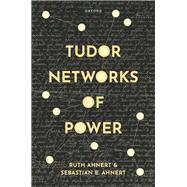- ISBN: 9780198858973 | 0198858973
- Cover: Hardcover
- Copyright: 1/12/2024
Tudor Networks of Power is the product of a groundbreaking collaboration between an early modern book historian and a physicist specializing in complex networks. Together they have reconstructed and computationally analysed the networks of intelligence, diplomacy, and political influence across a century of Tudor history (1509-1603), based on the British State Papers.
The 130,000 letters that survive in the State Papers from the Tudor period provide crucial information about the textual organization of the social network centred on the Tudor government. Whole libraries have been written using this archive, but until now nobody has had access to the macroscopic tools that allow us to ask questions such as: What are the reasons for the structure of the Tudor government's intelligence network? What was it geographical reach and coverage? Can we use network data to show patterns of surveillance? What role did women play in these government networks? And what biases are there in the data?
The authors employ methods from the field of network science, translating key concepts and approaches into a language accessible to literary scholars and historians, and illustrating them with examples drawn from this fantastically rich archive. Each chapter is the product of a set of thematically organized 'experiments', which show how particular methods can help to ask and answer research questions specific to the State Papers archive, but also have applications for other large bodies of humanities data. The fundamental aim of this book, therefore, is not merely to provide an innovative perspective on Tudor politics; it also aspires to introduce an entirely new audience to the methods and applications of network science, and to suggest the suitability of these methods for a range of humanistic inquiry.
The 130,000 letters that survive in the State Papers from the Tudor period provide crucial information about the textual organization of the social network centred on the Tudor government. Whole libraries have been written using this archive, but until now nobody has had access to the macroscopic tools that allow us to ask questions such as: What are the reasons for the structure of the Tudor government's intelligence network? What was it geographical reach and coverage? Can we use network data to show patterns of surveillance? What role did women play in these government networks? And what biases are there in the data?
The authors employ methods from the field of network science, translating key concepts and approaches into a language accessible to literary scholars and historians, and illustrating them with examples drawn from this fantastically rich archive. Each chapter is the product of a set of thematically organized 'experiments', which show how particular methods can help to ask and answer research questions specific to the State Papers archive, but also have applications for other large bodies of humanities data. The fundamental aim of this book, therefore, is not merely to provide an innovative perspective on Tudor politics; it also aspires to introduce an entirely new audience to the methods and applications of network science, and to suggest the suitability of these methods for a range of humanistic inquiry.







